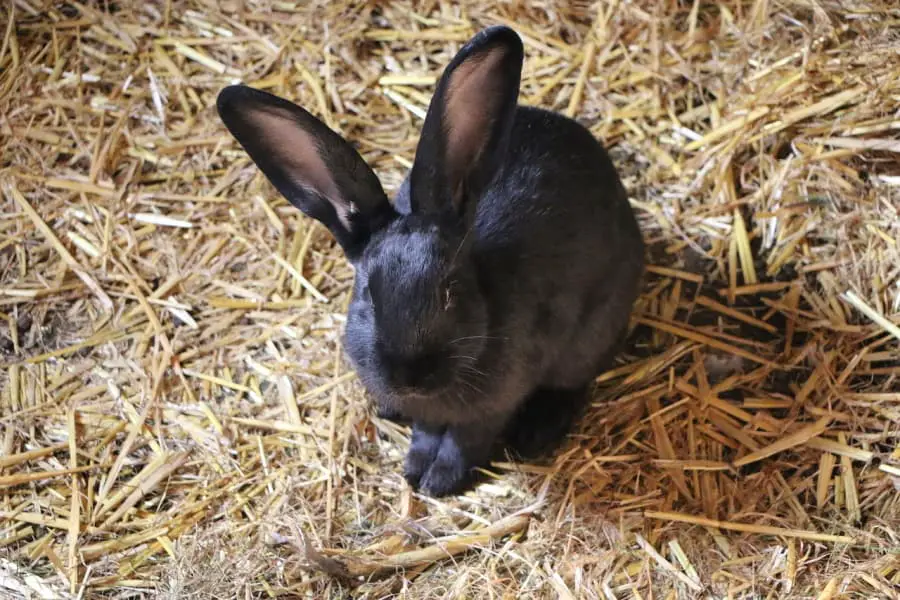
Rabbits are adorable creatures known for being quiet, loving, and somewhat fussy pets to have. They’re also fairly unique when it comes to their dietary needs and biology. Though they have lots of perplexing behaviors, most owners tend to notice one faster than others: their poop habits.
Their digestive system doesn’t process food through one pass and needs to be separated in order to work through their system. Their pellet pooping system makes it easy for waste to pass through with ease and is a way to ensure their guts stay clean.
Rabbit biology, in this sense, can be pretty gross. But, it’s also pretty fascinating, and knowing what to expect can help you take better care of your pet rabbit. This quick article will help you better understand what’s going on with your bunny.
Why Do Rabbits Poop Pellets?
Part of the reason why they poop pellets deals with their digestive tract’s design. Rabbits are what are called “hindgut fermenters,” which means that they have body parts that are specifically devoted to helping separate food from fibers they can’t digest.’
How Do Rabbits’ Digestive Tracts Change The Way They Poop?
Rabbits have a rather unique anatomy that makes their bodies very conducive to pellet pooping. This is thanks to their colons, their rectums, and a little gland called the cecum.
Their colons are small, which gives them a tendency of “balling up” fecal matter in a way that is similar to many other animals–like horses and sheep. Nutrients that they obtain from their digestive tract are sent to the cecum, which creates a different texture altogether.
That alone already encourages their poop to be balled up, but there’s a little more to this than just that. Their rectums also play a major role in poop shape.
How Do Rabbit Rectums Turn Poop Into Pellets?
A large part of poop shape is determined by an animal’s rectum. Some species’ rectums will stay open for a long time, others for a short time. Some animals have control over their rectums, while others don’t.
Rabbits have limited control over their rectums, and their rectums naturally squeeze in a rhythmic manner. This means that rabbit poop will pop out in equally-sized pellets and that you really won’t see any other size or shape come out of them.
Why Is Rabbit Poop So Firm?
If you’ve ever had to clean up after a bunny, you already know that rabbit poop is very firm compared to most other animals’ waste. This is by design and helps clean out a rabbit’s GI tract in order to ensure that they are capable of keeping their cecum production fairly clean.
A secondary reason why rabbit poop remains firm deals with water. Their poop is naturally very dry, and may actually be this way in order to help clean out their rectums for cecum.
Do Rabbits Eat Their Own Poop?
You might have heard that rabbits poop in pellets because it’s an easier shape for them to ingest. This is a common misconception people have when they first see their bunnies chowing down on something coming out of their behinds. Though it looks really suspect, rabbits do not eat their own fecal matter.
The truth is that rabbits make two different types of matter that comes out of their anuses: fecal matter and cecum pellets. Only fecal matter really has the pellet-like form that people associate with rabbits.
Cecum Pellets vs. Fecal Matter
When you look into a rabbit’s litterbox, you will see the tiny brown balls that are clearly poop. Those pellets are fecal matter, and rabbits don’t eat those. They are made of pure waste that has no nutritional value whatsoever.
Cecum, also known as cecotropes, are a bit different.
Cecotropes the separated nutrients that rabbits were able to get from the foods they ate. This stuff is made inside the rabbit’s cecal gland and contains healthy microbes rabbits need in order to stay alive.
Does Cecum Look Like Pellets Too?
It actually doesn’t, and that’s one way that rabbits can tell if they’re eating cecum or should get ready to poop. Cecum looks like mulberries or tightly clumped grapes and tends to be a little squishy to the touch. It also has a much darker appearance.
The texture of cecum versus feces is also by design. The wetness of cecum is due to a natural bacterial coating that offers up necessary immune system boosts for bunnies.
Why Does Cecum Smell?
If you’ve ever cleaned up a cluster of “night poops” from your bunny’s cage, you probably were taken aback by the smell. This is nothing to be concerned about, and actually is a sign of a healthy rabbit digestive tract.
The reason cecotropes smell so pungently is because of the bacteria and naturally-occurring flora they contain. Though it may smell foul to us, rabbits tend to smell it and feel it out as a great new meal.
Do Rabbits Need To Eat Cecum?
It may be gross knowing that your pet rabbit is eating stuff directly out of their anus, but you should never try to prevent your bunny from eating cecum. Cecum is a must for rabbit health and is an absolutely necessary instinct they need to have in order to survive in the wild or in captivity.
Rabbits do not have the ability to get all their nutrition straight from their diet. It needs to be processed through their bodies and infused with the bacteria they have in their digestive lining. Without actually eating cecum, there is no way for them to obtain the full spectrum of nutrition they need.
How Can I Tell If My Rabbit Is Eating Cecum?
If you notice your rabbit curled up in a ball and seemingly “licking” something near their behind, you’re probably watching them eat cecum. If they “poop” excess cecotropes, you might also see them eat it off the floor of their cage.
You don’t have to worry about personally witnessing cecotrope eating if you don’t want to. Most rabbits do it on a daily basis.
Should You Worry If Your Rabbit’s Poop Isn’t Pellet-Shaped?
Regardless of what species you’re dealing with, looking at poop can be a good way to determine health. If you notice that your rabbit’s poop is beginning to look watery, has stopped being pellet-shaped, or just doesn’t seem quite right, this absolutely should be cause for concern.
Irregular rabbit poop can be an indicator of:
- Food poisoning. Rabbits, much like any other species, can get sick from bad food. In many cases, runny poop could be a sign of food-related illnesses.
- Eating too little hay. Rabbits need hard fiber like hay in order to keep healthy. Tiny pellets can be a sign of having too little fiber.
- Eating too much fur. If you have an extra fluffy bunny, you might notice poop strung together like a string of pearls. This is a sign they’re eating their hair, which can lead to digestive problems later on.
- Eating too much heavy foods. Moist, large turds are an indicator of overeating in rabbits. Cut back on sweets when you feed them.
- Infections. Rabbits that are battling serious infections often will have runny diarrhea as a sign or symptom of experiencing serious pain.
Generally speaking, if you notice very runny diarrhea or any other major changes in their poop, you probably should take them to a vet. Even if it’s nothing, it’s often better to be safe than sorry.

